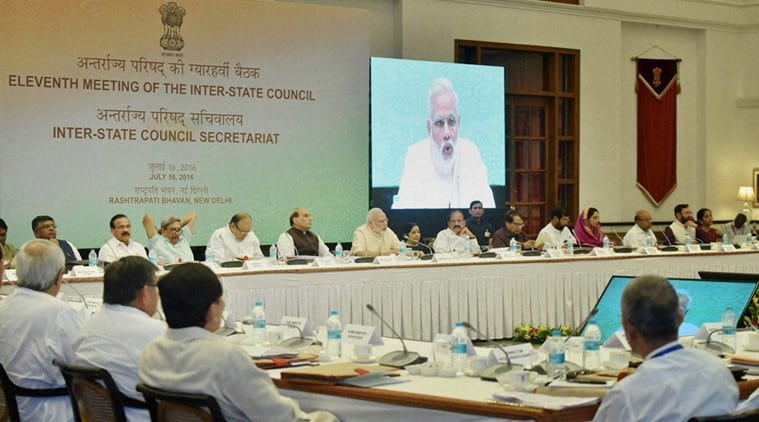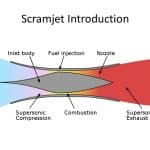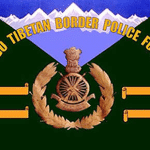Contents
TOPIC:Indian Constitution ( Inter State Council) – historical underpinnings, evolution, features, amendments, significant provisions and basic structure; Functions and responsibilities of the Union and the States, issues and challenges pertaining to the federal structure, devolution of powers and finances up to local levels and challenges therein.
ISC ( Inter State Council ) in news
- The 11th meeting of the Inter State Council was held on 16th July, 2016 after a long gap of 10 years.
- It was chaired by the PM Modi.
- Union Ministers, Chief Ministers and Administrators of Union Territories attended the meeting.
- In the previous meetings of the ISC, there was focus on only one or two sectors. But this time a range of topics were discussed of common interest to both centre and states.
- The PM said that the ISC is the most important platform for strengthening inter-state and centre-state relations.
Constitutional Dimensions ( Inter State Council)
- Article 263 under Part XI of the Indian Constitution provides for the establishment of the Inter-State Council (ICS).
- It is not a permanent constitutional body but can be established at any time by the President if he feels that public interest would be served with its establishment.
- The President is empowered to define the duties, organization and procedure of the ISC.
- In pursuance of the recommendations of the Sarkaria Commission (1983-87), the ISC was established in 1990.
- It has the following members:
- Prime Minister as the Chairman
- Chief Ministers of all states.
- Chief Ministers of Union Territories (UT) having legislative assemblies.
- Administrators of Union Territories not having legislative assemblies.
- Governors of States under President’s rule.
- Six Central cabinet ministers, including the home minister, to be nominated by the PM.
- Five Ministers of Cabinet rank/ Minister of State (independent charge) nominated by the Chairman of the Council are permanent invitees to the Council.
- It is a recommendatory body on issues relating to inter-state, centre-state and centre-UT relations.
- Its duties are:
- Investigating and discussing such subjects in which the states or the centre have a common interest.
- Making recommendation upon any such subject for the better coordination of policy and action on it.
- Deliberating upon such other matters of general interest to the states as may be referred to it by the Chairman.
- There is also a Standing Committee of the Council set up in 1996. for continuous consultation and processing of matters for the consideration of the Council.
- It has the following members:
- Union Home Minister as the Chairman
- Five Union Cabinet Ministers
- Nine Chief Ministers
Topics discussed in the meeting:
- There was a detailed discussion on the 2010 report of the Punchhi Commission on Centre-State relations.
- Aadhaar Card– The Aadhaar Act, 2016 enabled the government to use the Aadhaar for direct cash transfer for subsidy and other services. The Aadhaar card should be used to the maximum extent possible in the implementation of the welfare schemes. The state governments assured that they will provide maximum support in completing the enrollment and also in setting up DBT (Direct Benefit Transfer) cells.
- Youth– India’s greatest asset is its youth as over 30 crore children are now of school-going age. They should be equipped with the skill and ability to think logically and work creatively. The country has the potential to provide the world skilled manpower for many years to come. There should be a focus on improving classroom processes and in the quality of school infrastructure. Consensus emerged in the council with regard to improving the quality of education and learning outcomes. It was agreed that there has to be an improvement in the pupil-teacher ratio and in the training of teachers. All this should be done in a time bound manner.
- Intelligence sharing– The states should focus on intelligence sharing and ensuring greater coordination among the central and state agencies, so as to strengthen the internal security of the country.
- Police Force– The need for modernizing the police force with better equipment and training was also emphasized. There should be better coordination and interaction between the police departments of the States. ‘Smart Policing’ should be practiced and in this, technology and focus on training of the police personnel in matters relating to cyber crimes should be emphasized.
- Financial Resources– Panchayats and urban local bodies would receive Rs. 2,87,000 crore during the period of the 14th FC. The rights of the states will be kept in mind, even in revenue from the auction of natural resources. Through amendments to the CAMPA Act (Compensatory Afforestation Fund Bill), the Centre is trying to free up Rs. 40,000 crore lying in banks for disbursal to the states. The Centre also wishes to share with the States the amount saved as a result of transparency being introduced in the system.
Concerns of States:
- Misuse of Article 356 by the Union government- The use of this article should be limited to extreme and grave emergencies, when all other options had been exhausted. Nitish Kumar demanded the post of the Governor to be abolished altogether or Chief Ministers should be given a role in the appointment and removal of Governors.
- 14th Finance Commission recommendations– Uttarakhand CM said the recommendations had reduced the benefits available to his state.
- Centralization of Authority- Many felt that the Centre had been shifting subjects from the State List to the Concurrent List and from the Concurrent to the Union list. The states should have greater autonomy in respect of subjects in the State List and the Union should be extremely restrained in asserting parliamentary supremacy over them. Harmonious operation of the Concurrent List could be considered as cooperative federalism at its best Inter State Council.
- Scheme implementation- The states should have the right to implement schemes as per their needs.











